Steve Toussaint Isn’t Fazed by Racist 'House of the Dragon' Criticism
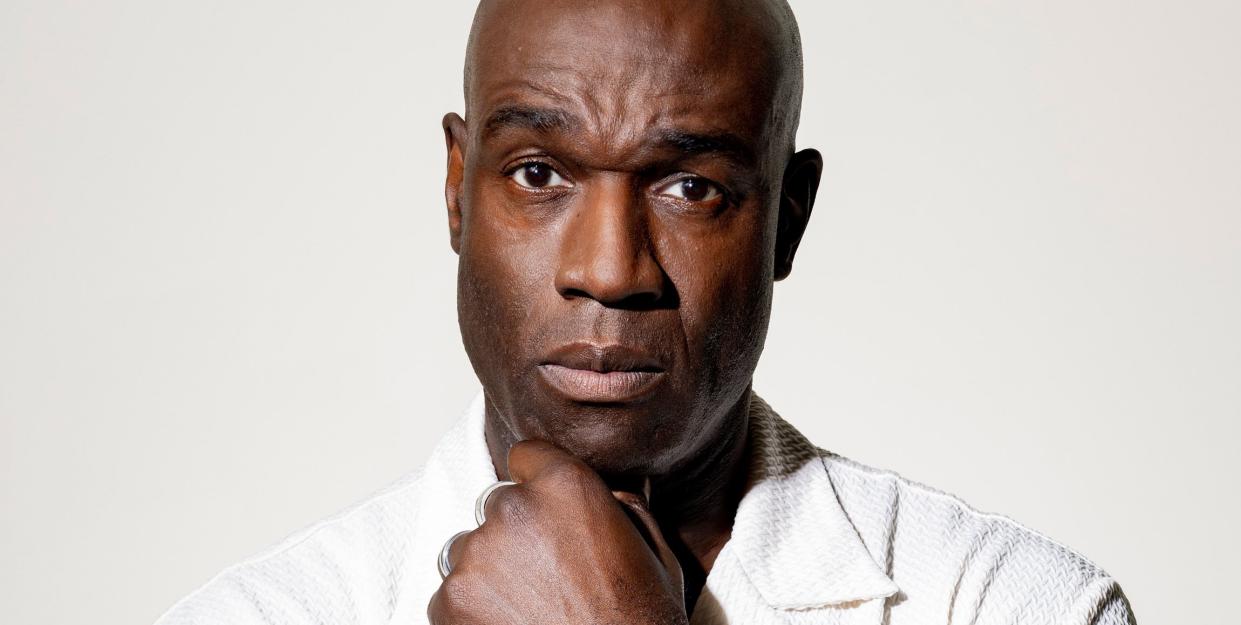
- Oops!Something went wrong.Please try again later.
- Oops!Something went wrong.Please try again later.
- Oops!Something went wrong.Please try again later.
It wouldn’t be a Game of Thrones series without a bloody battle, yet even with four weeks of training under his belt, Steve Toussaint wasn’t quite ready for the sheer exertion required for the violent beach scenes in House of the Dragon. “It was exhausting,” Toussaint chuckles over Zoom from his home in London. “My character doesn't carry a sword, he carries a huge, heavy staff. One end is a double-edged blade, and the other is a heavy ball for crushing skulls.”
The 57-year-old British actor has spent close to 30 years building a career of solid, character-driven performances–from parts in Judge Dredd to Steve McQueen’s Small Axe anthology series–but season one of HBO’s prequel series, set 172 years before the arrival of Daenerys Targaryen, put his endurance to the test as Lord Corlys Velaryon. “[In training,] I’d swing it in my shorts but then they put you in your costume and suddenly, it's on a sand dune,” he recalls. “There's smoke everywhere, the stunt guys aren't coming at you one-on-one, like in practice, they’re coming in from all over the place–you just hope they make it look good!”
Certainly with Miguel Sapochnik on board as co-showrunner—the director behind the epic Emmy-winning Thrones Season 6 episode “Battle of the Bastards”–Toussaint’s fighting performance was in good hands. Especially when his character, fondly known as the “Sea Snake,” has an admirable history in battle on land and sea. The head of House Velaryon, Lord Corlys is the richest man in Westeros, with the largest navy, thanks to a fortune he’s built from navigating the Seven Kingdoms as a seafarer. His Valyrian bloodline is as old as the Targaryens, a house he married into through Princess Rhaenys (Eve Best) and subsequently positions him as an ally to her brother, King Viserys I (Paddy Considine). A civil war is brewing in King’s Landing because of several would-be heirs to the Targaryen line of succession, and though Lord Valeryon might be on the sidelines in the opening episode, he has his sights set on further greatness. So don’t be surprised to see Toussaint’s white loc-rocking Sea Snake wield his court influence—as well as his fearsome staff—to best position House Velaryon for a move into an even more central position of power.
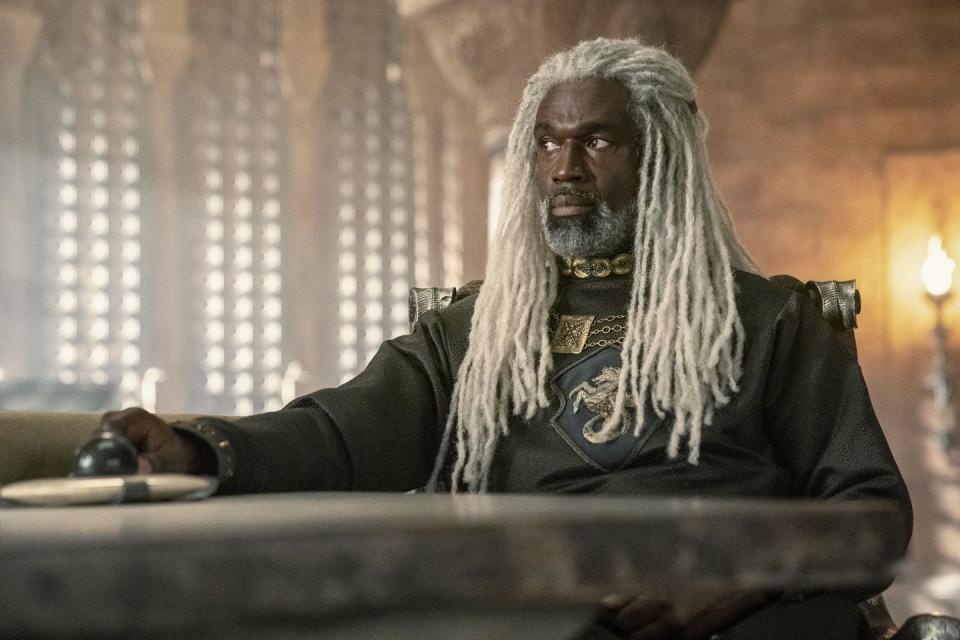
“He's all about legacy and about getting as close as possible to the throne,” Toussaint says. “This season is a lot about interpersonal relationships, political maneuvering, and is slightly more intimate than Thrones at its height. Whoever survives, we have a grounding with them. If you get to know who they are now, then the stakes are that much higher. But by the time I'd read the final scene, there were some things in it that had me like, “oh, you can't do that!”
If Game of Thrones has taught viewers anything, it’s that the writers will do whatever the hell they want. No one is safe in House of the Dragon. So with Season 1 hitting screens, Toussaint gives us the lowdown on his Westerosi player, getting used to the fandom amid casting backlash and what he hopes this season will course-correct for representation in this brutal fantasy world where anything goes…
Men's Health: Tell me how you landed the role of the Sea Snake.
Steve Toussaint: My agency said, “There's a project and here are some scenes, it might be a big thing.” They changed all the names, and my partner, who was reading it with me, was like, ‘This character sounds like Charles Dance's Tywin, and it turned out to be a scene with him and Diana Rigg. It wasn't until I had my first virtual meeting with the showrunners that I had any idea it was in that Game of Thrones universe.
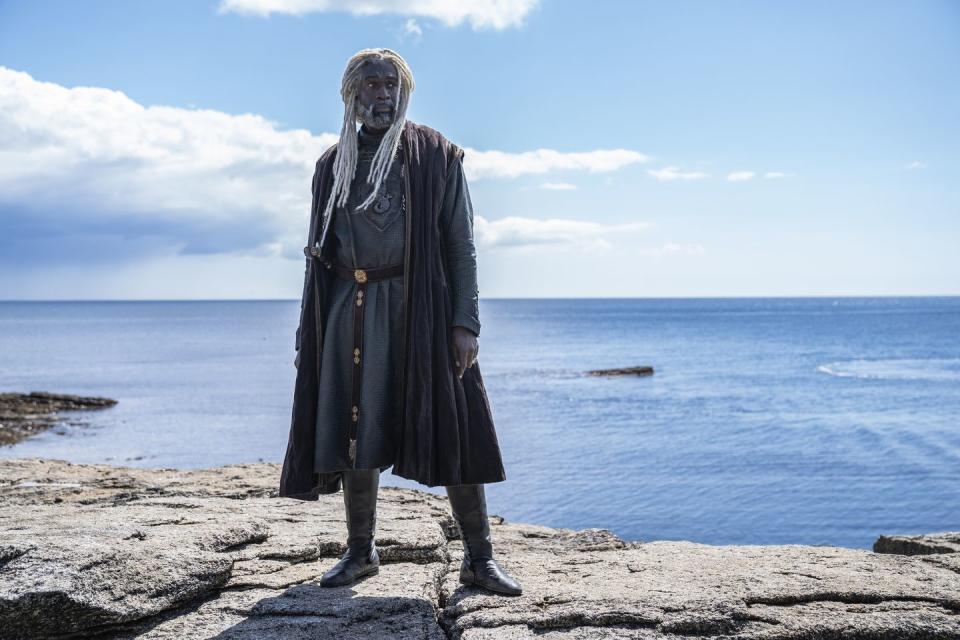
I suppose there's a lot of trust in auditioning for a role without having a clear idea of what it is.
If you're a big star then you get more information. But for those for us who are mere mortals...
…treasured character actors!
Yeah, that's it! You have to go on who is involved. By this stage, I knew that It was Ryan [J. Condal] and Miguel. I’d gotten proper scenes, and they tell you what's going to happen to your person over this amount of time. After that, of course, it's trust. I've done shows which I thought were just brilliant and then they don't quite catch on.
Or movies, like Prince of Persia: Sands of Time…
Haha! I was lucky because when I heard people talking [about the 2010 film's whitewashing], I was the only one that came out of it with people like, “Yeah, he could be in it.”
So you had the benefit of the book, but did you use it?
George Martin sent us all signed copies of the book. I was going to read it, then I thought, no. What I have to represent is what they've written in the script, and they're going to take liberties with it for dramatic purposes. So I didn't want to read his interpretation or know what happened to my character.
People sometimes forget that adaptation is not just doing a copy and paste job— you’re creating something for the screen. The very nature of you being a Black man in the role of Corlys Valeryon changes things. So, what can you tell us about your iteration?
They had just seen me in the Steve McQueen [Small Axe] film Red, White and Blue, so what we discussed more than anything else was fatherhood. He is this nautical explorer, the richest man in the land, and he's part of the governing council and so forth.
But ultimately, for me, what his engine is, is the fact that he's trying to elevate his family, elevate his name. When his wife was passed over for the crown, he seems to take it that much more personally than she does. Ambition is his driving force for most of the season.
He’s also not a Targaryen, so there's that feeling of being an outsider and trying to be accepted within the fold.
Yeah, there's a scene with Matt [Smith] playing Daemon, where I basically say, “We're the second sons; all of these other people, they had their wealth given to them. You and I, we had to go out and make it.” That's another bone of contention for him. Corlys had to go out and be a self-made man. He feels that very sharply.
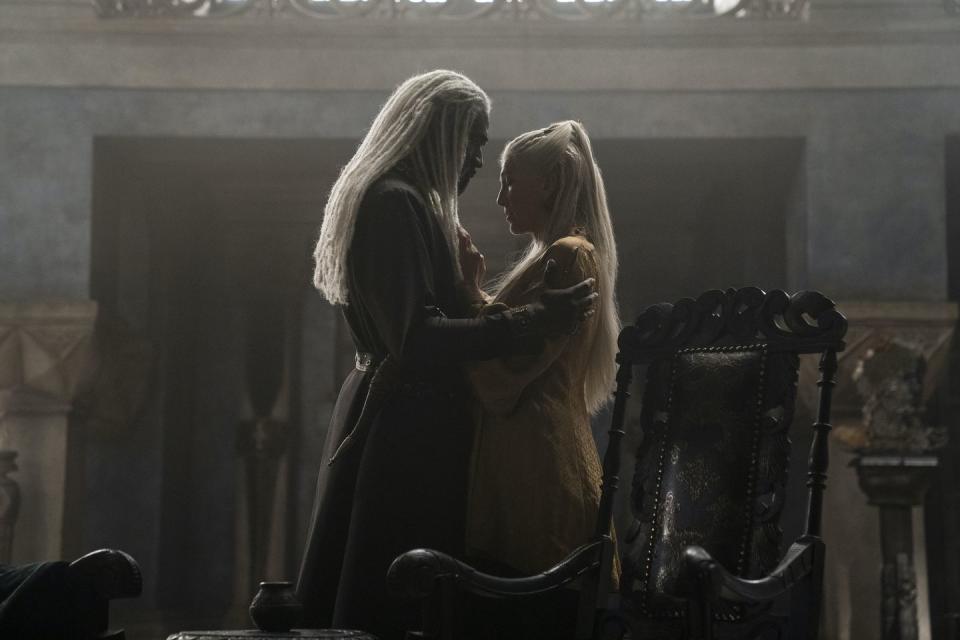
Is that why he keeps his wits about him in the first council meeting scene, when he's offered wine and declines a top-up?
That's come up a few times when people have asked, but that was a spur-of-the-moment thing. I'm glad that I did that and people picked it up.
Game of Thrones has a built-in audience with memes and screenshots being posted the minute an episode airs. Are you ready for the chaos?
For the most part of this whole experience, I've been sanguine about it. I was having a chat with Emma D’Arcy (Princess Rhaenyra). And they said, “I think you just take it in stride.” I'm still aware that people have to see the show. It's great that there are people excited. What has been wonderful is for every toxic person that has somehow found their way into my timeline, there have been so many others who have been so supportive and been like, “Oh my god, I can't wait, this is going to be great!”
Even when we were doing certain scenes, there would be supporting artists who would come up and go, “It's great to have this representation.”
Yeah, it’s like when people get annoyed about diversity in period dramas. First of all, people of color existed in the past. Secondly, if you care more about a guy’s skin color than the fact that everyone's miraculously got gorgeous teeth, it just shows your prejudice.
That's so true. So many people are basing their idea of the history of this country on a few films and stuff that were made in the '50s, '60s and '70s, which don't bear any resemblance to the truth. Historically, people of my hue and your hue, we didn't just turn up here in the '70s or the '60s. There was a point when the ruler of his country, “the Caesar”, was an African man. There are street names that tell you there were people who looked like us in this country even then, but for some reason, it seems to be very hard for people to swallow. And as you said, they are happy with a dragon flying. They're happy with white hair and violet-colored eyes, but a rich Black guy? That's beyond the pale.
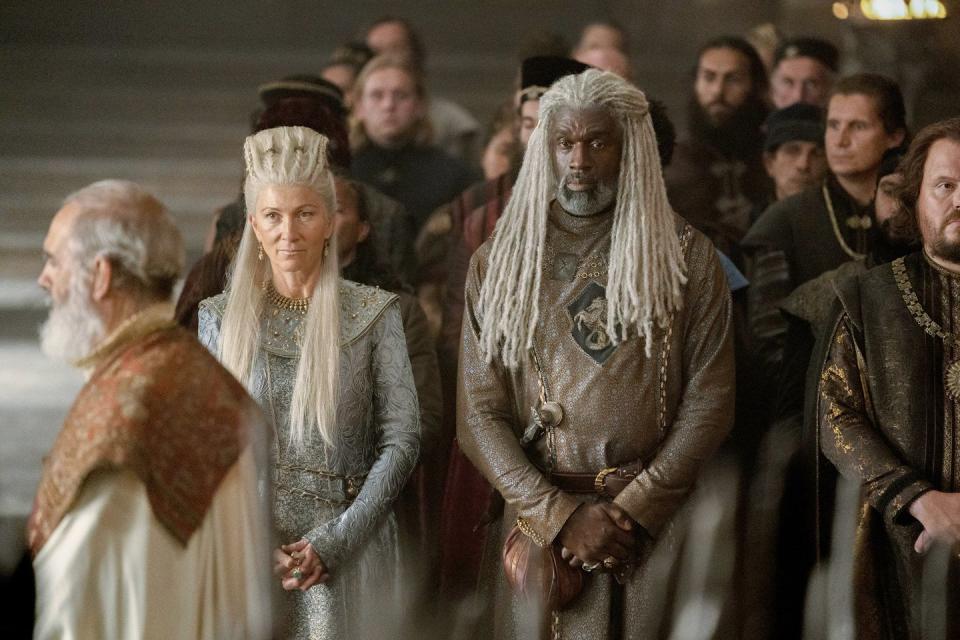
So tell me about the look of your house. I love that you have white locs and your mixed kids have curly hair.
That was down to the guys before I even got there. The costume designer would send me sketches and the look was down to, I guess, Ryan and Miguel. When they asked me to stop shaving, I was like, “Oh no!” I'm not a big fan of the beard, but it's part of the look. It's striking. Even if the show doesn't do well, I will look good and that's what's important!
He's a seafarer, so how much time do we spend at sea?
The closest I got to the sea is during a battle which takes place on a beach. Our home was shot in a place called St. Michael's Mount. It's a stately home, where you can only access it at certain times of the day, because the tide comes in and you can't get to it. It’s beautiful down there. We shot a bit in Cornwall, but most of it was at the studio.
So with such a storied career, how has your back catalog of work prepared you for this mammoth endeavor?
I guess Prince of Persia did. It was the biggest thing in terms of a budget that I'd ever been on before. But in terms of the amount of eyes on this, from the minute it was announced, well, no, I've never had anything like that. Even when we were doing Prince of Persia, I remember asking the publicity guy one day, “Where does this rank in what's happening in the world at the moment?” He said, “Oh, this is the biggest movie in the world right now.” But the majority of the world, they're just like, oh, there's a big movie coming out. With this, the minute they announced it was like, “Oh, my God.”
Social media wasn't as popular then either.
I've not been used to that before. But the job is still the job, you still have to learn the lines, you still have to try and sound convincing when you say the things and you make sure you don't bump into the furniture. You try to keep hold of that.
What do you think House of the Dragon has to say about the world?
A TV show or film, wherever it's set, it reflects the time that it was made. One of the criticisms of Thrones, particularly the early seasons, was that there was a feeling of exploitativeness, particularly for the women.
I've never met Emilia Clarke, but I've read stuff that she said and how she was able to assert herself more as the seasons went on. At the beginning, you just see all sorts of things happening to her. I hope in [House of the Dragon] the importance of having other voices in the room comes across. The fact that we have women directors and women writers, there’s less of the exploitative thing. There is violence and sex, but the crux of this is the conflict between two ladies [Princess Rhaenyra and her friend Alicent Hightower]. Whether that reflects the growing status and power of women in our society, I don't know. It's still about relationships. It's still about people trying to maneuver. It's still about whose eyes you're looking into when you're speaking. I guess I'll have to watch all of it and then come back to you.
You Might Also Like

